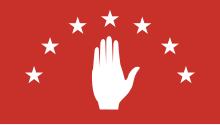Our website is made possible by displaying online advertisements to our visitors.
Please consider supporting us by disabling your ad blocker.
Abazins
This article needs additional citations for verification. (July 2015) |
 Flag of the Abazins | |
| Total population | |
|---|---|
| 210,000 (est.) | |
| Regions with significant populations | |
| 15,000–150,000[1][2] | |
| 43,341 36,919 3,646 418[1] | |
| 5,000–15,000[3] | |
| 128[4] | |
| Languages | |
| Abaza, Russian, Arabic, Turkish | |
| Religion | |
| Predominantly Sunni Islam | |
| Related ethnic groups | |
| Abkhazians, Circassians | |

The Abazin, Abazinians or Abaza (Abaza and Abkhaz: Абаза; Circassian: Абазэхэр; Russian: Абазины; Turkish: Abazalar; Arabic: أباظة) are an ethnic group of the Northwest Caucasus, closely related to the Abkhaz and Circassian peoples. Now, they live mostly in Turkey, Syria, Jordan, Egypt and in Karachay-Cherkessia and Stavropol Krai in the North Caucasus region of Russia. The Tapanta (ru:Тапанта), a branch of the Abaza, lived between the Besleney and Kabardian princedoms on the upper Kuban.
Abaza people historically speak the Abaza language, a Northwest Caucasian language most closely related to Abkhaz, and more distantly related to the Ubykh and Circassian languages. There are two dialects of Abaza spoken in Karachay-Cherkessia: Ashkharua and Tapanta. The culture and traditions of the Abazin are similar to those of the Circassians. On many old maps Abazin territory is marked as part of Circassia (Adygea).
According to the 2010 Russian census, there were 43,341 Abazins in Russia.[1]
- ^ a b c "Abazinsky District, Karachay-Cherkessian Republic, Russia", crwflags.com, archived from the original on 2023-03-20, retrieved 2022-12-29
- ^ "Ethnologue.com". Archived from the original on 2012-11-12. Retrieved 2013-06-20.
- ^ Cite error: The named reference
daharchives.alhayat.comwas invoked but never defined (see the help page). - ^ "About number and composition population of Ukraine by data All-Ukrainian census of the population 2001". Ukraine Census 2001. State Statistics Committee of Ukraine. Archived from the original on 17 December 2011. Retrieved 17 January 2012.
Previous Page Next Page


